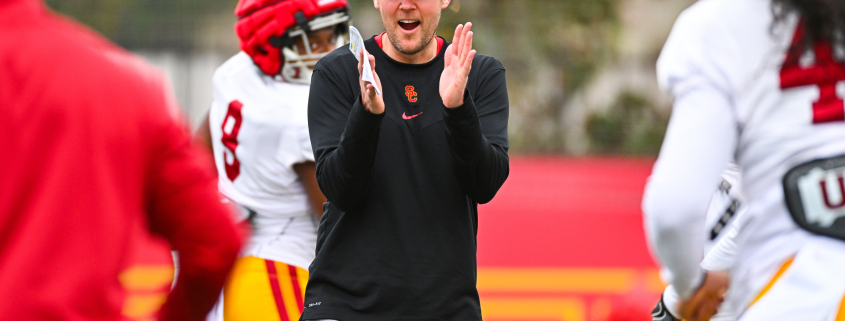Lincoln Riley breaks down early culture changes

Through two weeks of spring practice, Head Coach Lincoln Riley is having fun.
When practices come around, he doesn’t want them to end. Riley said he gets the sense that players are feeling the same way — bringing energy and physicality to a team that lacked some of that as the 2021 season dragged to an end.
The energy at spring practices continues to stick out but not as much as the overall competitiveness from players.
“This team’s competitive nature, once the pads have gotten on, has risen,” said Riley during a Zoom press conference Saturday. “It’s been very positive so I think that’s been good.”
During former Head Coach Clay Helton’s tenure, a lack of accountability for players became increasingly common, with key penalties haunting the Trojans in games. Those accountability issues came out once Helton was fired, making Riley’s task of creating accountability crucial.
So far, it seems he’s figured that portion of the problem out.
Riley joked that reporters would be on the Zoom the entire weekend if he broke down the steps taken to ensure accountability. He emphasized that the staff treats everything from going to class to the weight room as the same.
“We’re all held to the same standard. There’s no leeway, there’s no excuses, there’s no ‘I thought,’ there’s no ‘We do it now, but when football season comes we don’t,’” Riley said. “That doesn’t matter. It’s the standard; it is what it is, every single person, every day and we’re going to be relentless about that.”
The Trojans have responded with “rapid progress,” Riley said.
Breaking bad habits while instilling a culture of good habits can be tricky. However, he said that the staff attempts to “clearly articulate” not just everything they want from the players, but how they want them to do it.
Most of the process behind building a strong culture is about choices. Unlike Helton’s era, players will need to consider the consequences of making wrong moves.
“Guys that continually make the right choices are going to get better. They’re going to be a part of great things here,” Riley said. “[With] guys that don’t, there’s going to be repercussions. It is what it is, and I think it’s just a consistent approach and not taking into account guys’ experience before this.”
An aspect of culture change is the recent implementation of a helmet decal process, “Gold Plated.”
Players start with a blank Cardinal helmet and work their way to the Trojans logo. Demonstrating habits off the field and on the field, having competitive nature, upholding accountability and showing reliability are all qualities that will earn a decal.
Teammates can nominate each other for the decal with staff members giving the final stamp of approval. The number of players who have earned that decal has entered the double digits.
“We felt like this is one of the most iconic programs; it’s one of the most iconic jerseys, helmet, uniform combo that there is, and we felt like that decal should be earned, not just given because you’ve got a spot on the roster,” Riley said.
Redshirt freshman wide receiver Kyron Ware-Hudson and redshirt junior wide receiver Tahj Washington have been “particularly fun to work with,” Riley said. With last season’s leading receiver Drake London heading to the NFL, Ware-Hudson and Washington could possibly carve themselves a role in the offense.
Oklahoma transfer Mario Williams, Washington transfer Terrell Bynum and Colorado transfer Brenden Rice round out a loaded wide receiver room. Returnees, such as junior Gary Bryant Jr. and redshirt junior Kyle Ford, have garnered some attention too.
For now, the culture changes will continue to be the topic of spring practice.

